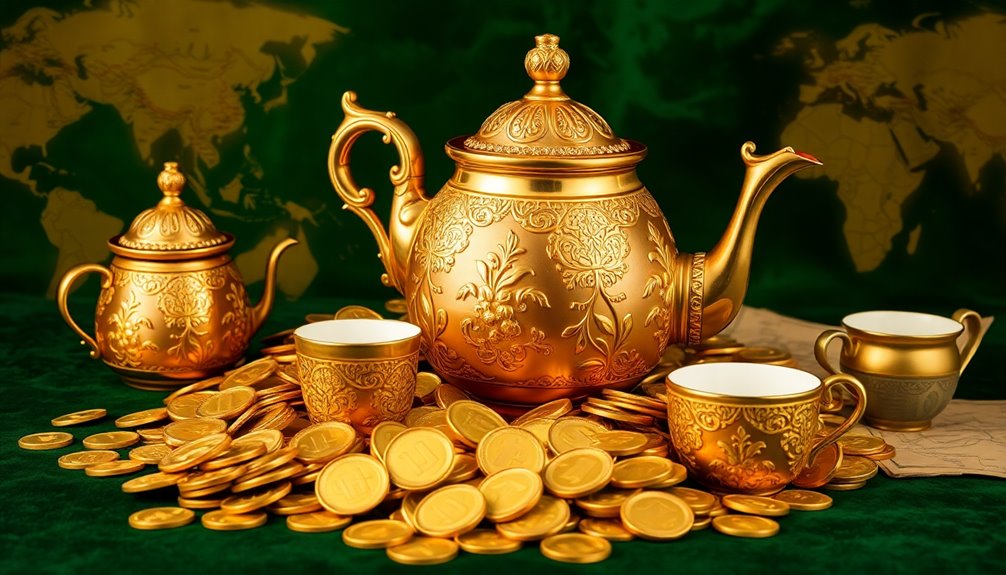The tea taxes during the American Revolution acted as major economic catalysts that united colonists against British control. By imposing taxes on tea, Britain aimed to assert authority, but colonists saw this as a violation of their rights and refused to buy taxed tea. The boycott hurt British merchants and created economic pressure, turning a financial issue into a symbol of resistance. If you want to learn more about how these taxes fueled the push toward independence, keep exploring.
Key Takeaways
- Tea taxes symbolized British economic dominance, prompting colonists to reject taxation without representation.
- The tax made British tea more expensive, encouraging colonists to boycott in protest.
- The boycott reduced British tea sales, creating economic pressure on British merchants and the East India Company.
- The Boston Tea Party was a direct action against the Tea Act, challenging British control and taxation.
- Tea resistance united colonies, transforming economic grievances into a collective movement for independence.

Have you ever wondered why tea became such a symbol of rebellion during the American Revolution? It all ties back to the colonial resistance against British taxation and control. When the British government imposed taxes on tea, it wasn’t just about the price; it was about asserting authority over the colonies without their consent. The colonists saw these taxes as a violation of their rights, and many refused to accept them. They believed they shouldn’t be taxed without representation in Parliament, and tea became a focal point for expressing this frustration. By boycotting British tea, colonists demonstrated their refusal to accept economic domination from afar. This act of defiance fueled broader resistance, ultimately uniting the colonies against British policies.
The economic impact of these taxes was significant. Tea was one of the most popular beverages among colonists, and the tax made it more expensive than local alternatives. As a result, colonists began to reject British tea altogether, which hurt British merchants and the East India Company, the main supplier of tea to the colonies. This decline in sales created economic pressure on British businesses, highlighting how colonial resistance could influence trade and commerce. The colonists’ refusal to buy taxed tea sent a clear message: they wouldn’t accept economic measures that undermined their financial independence. This boycott wasn’t just about refusing a drink; it was a strategic move to weaken British economic interests and challenge their authority. Additionally, the economic pressure on Britain highlighted the interconnectedness of colonial resistance and imperial trade policies.
When the British responded with policies like the Tea Act of 1773, which allowed the East India Company to sell tea directly to colonists at a lower price—yet still maintained the tax—the colonists saw it as a ploy to trap them into accepting taxes. Their resistance intensified, culminating in the Boston Tea Party, where they dumped surplus tea into Boston Harbor. This act of protest was more than a symbolic gesture; it was a direct challenge to British economic control and a rejection of unfair taxation. These events made it clear that the colonists would no longer tolerate economic interference without representation. The tea tax crisis mobilized the colonies, transforming economic grievances into a collective fight for independence. In the end, tea became a potent symbol of colonial resistance, embodying their struggle against economic exploitation and political subjugation.
Frequently Asked Questions
How Did Tea Taxes Influence Colonial Social Hierarchies?
You see, tea taxes challenged colonial social stratification by uniting diverse groups in protest. The Boston Tea Party became a powerful act of defiance, symbolizing resistance across social hierarchies. This Tea party symbolism blurred traditional roles, empowering lower classes and encouraging unity among colonists. As a result, these taxes indirectly reshaped social dynamics, fostering a collective identity that questioned established authority and reinforced the fight for independence.
Were There Any Economic Benefits for Britain From Tea Taxes?
They say “no pain, no gain,” and with tea taxes, Britain saw some benefits. You might think trade restrictions hurt more than helped, but in this case, the taxes boosted revenue generation. By imposing tea taxes, Britain strengthened its control over colonial trade, increasing profits. While it sparked unrest, these taxes provided a financial boost to Britain’s economy, making them a key, if controversial, economic strategy.
How Did Tea Smuggling Impact the Colonial Economy?
You see, colonial smuggling had a significant economic impact on the colonial economy. It allowed merchants to avoid paying heavy tea taxes, keeping prices lower and maintaining profits. This illegal trade undermined British revenue and encouraged resistance. Smuggling also fostered a sense of independence among colonists, as they relied on clandestine activities instead of official channels, ultimately weakening Britain’s economic control and fueling revolutionary sentiments.
What Role Did Tea Taxes Play in Uniting Different Colonies?
Like the storm that united ships in a common voyage, tea taxes sparked colonial unity and protest mobilization. These taxes, seen as unjust, prompted colonies to band together against British rule. The shared outrage over taxation fostered communication and coordinated resistance, laying the groundwork for collective action. As a result, the tea tax controversy became a catalyst that strengthened colonial bonds and fueled the push toward independence.
Did Tea Taxes Affect Non-Importing Colonial Merchants?
You might think tea taxes only affected importers, but non-importing colonial merchants also felt their impact. Colonial protest grew among merchants who opposed the taxes, even if they didn’t directly import tea. Some merchants faced pressure to comply with new laws, risking their reputation or business relationships. This widespread resistance strengthened unity among colonists, showing that even those not directly involved in tea trade felt the economic and political effects.
Conclusion
You can see how those tea taxes, though seemingly small, sparked a revolution. Did you know that the tax on tea was just three cents per pound, yet it fueled widespread protests and the Boston Tea Party? That small tax became a powerful symbol of resistance, showing how economic policies can ignite major change. So, next time you sip your tea, remember how a tiny tax helped shape a nation’s fight for independence.










